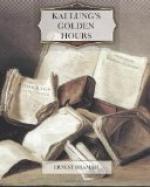“Be that as it may,” replied Li-loe, with mulish iteration, “five deficient strings of home-made cash are a meagre return for a friendship such as mine.”
“There is a certain element of truth in what you claim,” confessed Kai Lung, “but until my literary style is more freely recognized it will be impossible to reward you adequately. In anything not of a pecuniary nature, however, you may lean heavily upon my gratitude.”
“In the meanwhile, then,” demanded Li-loe, “relate to me the story to which reference has been made, thereby proving the truth of your assertion, and at the same time affording an entertainment of a somewhat exceptional kind.”
“The shadows lengthen,” replied Kai Lung, “but as the narrative in question is of an inconspicuous span I will raise no barrier against your flattering request, especially as it indicates an awakening taste hitherto unsuspected.”
“Proceed, manlet, proceed,” said Li-loe, with a final probe among the surrounding rocks before selecting one to lean against. “Yet if this person could but lay his hand—”
The Story of Wong Pao and the Minstrel
To Wong Pao, the merchant, pleasurably immersed in the calculation of an estimated profit on a junk-load of birds’ nests, sharks’ fins and other seasonable delicacies, there came a distracting interruption occasioned by a wandering poet who sat down within the shade provided by Wong Pao’s ornamental gate in the street outside. As he reclined there he sang ballads of ancient valour, from time to time beating a hollow wooden duck in unison with his voice, so that the charitable should have no excuse for missing the entertainment.
Unable any longer to continue his occupation, Wong Pao struck an iron gong.
“Bear courteous greetings to the accomplished musician outside our gate,” he said to the slave who had appeared, “and convince him—by means of a heavily-weighted club if necessary—that the situation he has taken up is quite unworthy of his incomparable efforts.”
When the slave returned it was with an entire absence of the enthusiasm of one who has succeeded in an enterprise.
“The distinguished mendicant outside disarmed the one who is relating the incident by means of an unworthy stratagem, and then struck him repeatedly on the head with the image of a sonorous wooden duck,” reported the slave submissively.
Meanwhile the voice with its accompaniment continued to chant the deeds of bygone heroes.
“In that case,” said Wong Pao coldly, “entice him into this inadequate chamber by words suggestive of liberal entertainment.”
This device was successful, for very soon the slave returned with the stranger. He was a youth of studious appearance and an engaging openness of manner. Hung about his neck by means of a cord were a variety of poems suitable to most of the contingencies of an ordinary person’s existence. The name he bore was Sun and he was of the house of Kiau.




